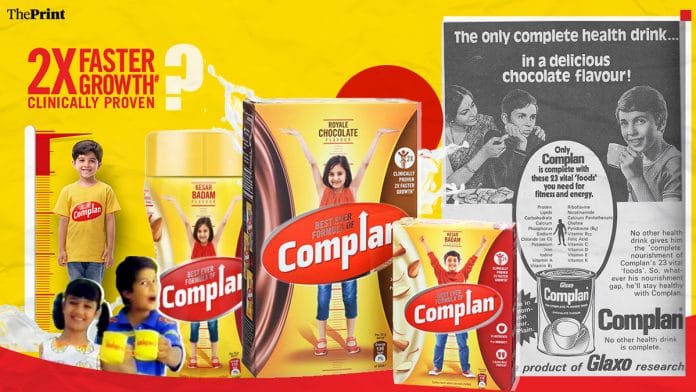New Delhi: The phrase “I am a Complan boy or girl” has an evergreen resonance for anyone who has spent their childhood drinking milk mixed with Complan. The additional claim that the malt-based powdered milk drink helped increase height also tempted a lot of children.
An interesting thing about Complan was that doctors were the first to encourage Complan — a shortened version of ‘Complete Food Plan’ — as a convalescence drink in 1964, when Glaxo, a pharmaceutical firm based in the UK, first brought it to India.
It was developed by the firm during World War I as an essential nutritional supplement for soldiers in the United Kingdom in 1954.
But in India, the marketing strategy went one step further and promoted the drink mix as being superior to milk with the tagline “Complan has 23 vital nutrients whereas milk has 9” for growing children.
This was also cemented by the now iconic advertisement in the early 1980s, conceptualised by noted advertising firm Leo Burnett, which made the nutritional drink a household name in India.
The ad featured Shahid Kapoor and Ayesha Takia, who were child actors then, and the tagline ‘I am a Complan boy/girl’ became immortalised because of it.
“In an era where brand distinction depended on little tweaks, the now basic-sounding ‘I am a Complan boy’ became a rage!,” brand strategist Harish Bijoor told ThePrint.
Also read: ‘Wagle ki Duniya’, the lovable, comical hit DD show that captured 80’s Indian middle class
‘Exaggerated ads, excess sugar content’
Kraft Heinz, an American food conglomerate, bought Complan from Glaxo in 1994 and it was after that the company repositioned itself as an ideal health drink for ‘two times faster growth for kids’.
However, this claim was challenged on several occasions.
In 2007, the Advertising Standards Council of India (ASCI) sent a notice to Heinz India to either change or remove an advertisement saying Complan will increase a child’s height by as much as two times. But nothing came off it.
In May 2010, the Maharashtra Food and Drug Administration (FDA) filed a chargesheet against Complan over its “exaggerated” advertising claim that it can help children “grow twice as fast.”
Four months later, an 11-year-old boy from Delhi committed suicide after his height remained the same even after consuming Complan.
Despite all this, there was no change in the marketing strategies of the company. On several occasions, Heinz has noted that the claims of increasing heights is based on a clinical study but experts have flagged concerns about the study since it was funded by Heinz.
“These products only serve the purpose of enhancing the taste of milk that children tend not to like, leading them to never drink milk by itself and always associating it with a sugary, chocolate-filled taste,” Priya Kathpal, nutritionist and founder of Nutrify told ThePrint.
For instance, 100g of Complan powder contains 18g of protein, 11g of fat and 62g of carbohydrates, of which 24g is sugar.
Similarly, in Bournvita, 7g is protein, 1.8g fat and 85.2g carbohydrates, of which 32g is sugar. Horlicks is 11g protein, 2g fat, and 79g of carbohydrates, which includes 13.5g of sugar.
In 2018, Complan was bought by Zydus Wellness, India’s fourth-largest pharmaceutical company, for Rs 4,595 crore.
Also read: 50 yrs & still ticking — Ajanta, world’s largest wall clock maker, remains an Indian favourite
Complan vs Horlicks
Powdered milk drinks have emerged as an extremely competitive space in India, with brands constantly evolving their packaging, prices and marketing strategies.
“The category of milk food drinks have been a very competitive space in the times gone by. Horlicks, Boost, Bournvita and Complan have always been close competitors,” Bijoor told ThePrint.
In 2013, The Economic Times listed Complan and GlaxoSmithKline’s Horlicks among India’s most notable brand battles and called the latter a better and a cheaper option in terms of nutritional value and market price.
Complan and Horlicks were involved in aggressive comparative advertising over the years but in 2018 the mudslinging got really ugly when both of them directly denigrated each other’s trademarks in their ad campaigns.
This ended with Heinz moving the Bombay High Court objecting to the Horlicks ad, while GSK approached the Delhi High Court against the Complan ad.
In 2020, the Delhi HC also restrained Complan from airing the commercial that claimed that one cup of Complan was equivalent to two cups of Horlicks.
However, despite its aggressive advertising and ‘tall claims’, Complan’s market presence began to decline in 2013 when it was outrun by Cadbury’s Bournvita, which maintained the second spot in the business after Horlicks.
According to business intelligence platform Alt Info, the brand’s share, which once stood at more than 15 per cent of the entire sector in the early years of the last decade, has declined to just 5 per cent this year.
Meanwhile, Horlicks and Boost, both owned by GSK, combined hold 54 per cent of the malt beverage market, followed by Bournvita with 15 per cent, 9 per cent by PediaSure and Ensure, and 17 per cent of the market is made up of the remaining companies.
Also read: M.A.D with Rob, the 2000s craft show on Pogo that turned kids into DIY experts






